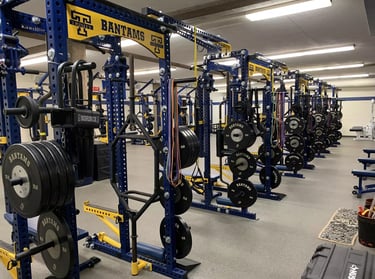

What to Expect on College Visits
8/28 CGC Staff
Summer tournaments have started winding down, and the official college visit season has begun. While the class of 2026 commitments have started trickling in since coach/athlete in person contact began on August 1st, many athletes started official visits in the last few weeks and will continue their journey this fall. Some have their ‘dream school’ in mind and commit after one visit, and others want to explore their options and take their time choosing their future home. We take a look at the official visit process, what to expect, and provide some recommendations for recruitable athletes and their families.


-What is the difference between an official and unofficial visit?
An official visit is coordinated between the coaches, the athlete, and the athlete’s family and can last no longer than a 48-hour time period. On an official visit, the institution is allowed to pay for the athlete’s and parents’ transportation to and from the visit, which now includes airfare for the parents, lodging, up to three meals per day, and for tickets to a sporting event on campus. During an unofficial visit, these costs cannot be covered by the school, with the exception of sporting event tickets.
-How many visits can I take and how many should I schedule?
While prospective college athletes were once limited to five official visits, the NCAA now allows unlimited visits. An athlete can only have one official visit per school, unless there is a coaching change. That being said, an athlete can visit one school numerous times on their own dime. The number of visits that an athlete schedules depends on their preference, and there is no magic number. Some athletes know what school they want, and if that school’s coach feels the same, they may only schedule one visit and commit on the spot. Others may have a top-5 or a top-3 list and schedule their visits in a 1-2 month span. If an athlete has offers from schools in that tier, it is not necessary to schedule visits to schools that are not near the top of their list. Although it may be nice to visit another campus and see a great football game, it is respectful to not waste a coach’s time. Although it is unusual, some athletes schedule more than 5 visits because they truly don’t know which school they want to attend and want to experience every campus, team, and coaching staff that invites them. It is recommended not to take more than 2-3 consecutive weekend visits, as these visits can be physically and mentally exhausting.


-What happens on a visit?
No two visits may be the same, but there may be many similarities between visits at various universities. Some are very structured, and others tend to be more laid back. Expect a tour of the campus, including academic buildings, dormitories, athletic and workout facilities, and dining areas. There may be meetings scheduled with strength and conditioning coaches, NIL personnel, academic advisors, and members of the athletic department. Meals may be scheduled with current team members and coaches, with a dinner off campus with the coaches and their significant others. There will be a tour of the school’s home courses and golf facilities, and the athlete may play a round of golf with current team members. At some visits, an athlete stays overnight with an upperclassman, but some are expected to stay at the hotel with their family. Sometimes an athlete will hang out with the team at night following dinner. As long as these activities remain in the 48-hour window, they are fair game to be on a visit schedule!


Photo: Trinity College Athletics
-What are the dos and don’ts on a visit?
Do: Find out as many things as possible about the campus, school, academic requirements, golf facilities, and program culture. Ask pertinent questions to try to find if the school and staff will be the perfect fit and find out what sets the school apart from other programs. Talk to the coaches, current team members, and academic staff. Regarding academics, ask about the support the school provides to athletes, available academic and SAT/ACT minimum scholarships, and AP scores needed to receive college credits. Talk to team members and pick their brains about all things college: dorm life, dining facilities, class rigor, team culture, and the coaches personalities. Ask the coaches about practice schedules and expectations, qualifying procedures, travel logistics, and availability of individual spots at tournaments. Don’t be afraid to ask what your chance for a lineup spot is when you get to campus, and where you fall on their recruit list. Also talk to the strength and conditioning coaches to learn their expectations for a workout program.
Do: Be honest and direct about what other schools you are visiting, and where the school you are currently visiting falls on your list of schools. Coaches talk to each other, and they likely have heard about other schools you are visiting.
Do: Show your true self and personality. A college visit is the perfect time to see how your personality meshes with the coaches and future teammates. Be your authentic self and don’t try to be someone that you’re not just to impress someone. You will hopefully be spending four years with your coaches, and compatibility is important.
Parent don’ts: Don’t answer for your child! When coaches ask an athlete questions, they want to hear from the athlete and not the parent. Coaches like to see athlete independence and the ability to speak for themself.

